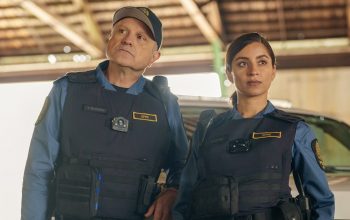As we get ready for the third episode of FX’s Fargo, it’s time for another edition of “Take 5” — and this one features Bob Odenkirk! Last week, we joined a press call with Odenkirk to chat about Fargo and his character, Bill Oswalt. The conversation also included a bit about his iconic character from Breaking Bad and upcoming series Better Call Saul, and his extensive background in comedy. Here are some highlights from that call … and be sure to watch Fargo tonight at 10pm ET/PT on FX and at 10pm ET on FXX in Canada.
On the differences between his approach to roles on more dramatic series versus comedic series:
I wouldn’t say I approach them differently, but they’re pretty fundamentally different. My experience, and it might be just the kind of comedy that I do, which is usually sketch comedy, is that there’s a lot more texture and sort of subplot in drama than in comedy. In comedy you can read the script and you can know the motivations and the reason for the character very quickly and off a simple quick first read. With drama my experiences, and it comes off Breaking Bad, is as you read the dialog, which at first might look like just argument or obfuscation or something, you start to see these inner drives of the characters that were planted there by the writers; and so it’s a more focused and it reveals itself to you, whereas comedy is just kind of right there when you first read it.
On how his character, Bill Oswalt, feels about his new role as Chief, and what is coming up as they continue to investigate the crime spree that has erupted in town:
[In “The Rooster Prince”], you saw how Bill feels. You started to scratch the surface of what Bill thinks his job is, which is I think his notion of to protect and serve, the motto of many police departments, I think he takes the protect part a little too far. He’s literally wanting to protect these people, in this case Lester, from suspicion.
I think he thinks it’s his job to believe in his local community, and in this case, he’s defending this person he’s known his whole life from even being investigated. I think he’s a frustration if you’re the character of Molly, but he’s a good guy. He just wants to believe in the goodness of his community and that’s a good instinct for a police officer to have, so it’s a conflict and it will put him in a vise as time goes by in this show. That’s all I can say, an emotional vise.
On the subtext to his characters on Fargo and Breaking Bad, and how those characters are also playing a role:
I think both these characters are trying to play a role. In Bill’s mind, he’s trying to be the sheriff and the good man, who’s protecting his community and it’s funny because he’s wrong and he’s floundering a bit and you can feel it.
People love to laugh at hypocrisy and that distance between who you think you are and who you really are and who you’re trying to present yourself as. Those characters are a little different from the other characters in the show in that they have these conflicts between who they present themselves as and who they really are; whereas I think some of the other characters, they don’t have that conflict or that distance, and it is funny to watch because they’re not world beaters. They’re failing a little bit, too. It’s funny to see somebody flounder, who is just putting on a show, who’s trying to delude everybody around him and it’s not working. That’s the fun part.
On the challenges of being tasked with adding moments of lightness to a darker series without coming across as the “comic relief”:
There is a challenge and it is a conscious effort that you have to make or I have to make to try to get it to the right place, so that it belongs in the world that I’m playing in and isn’t outsized too big. I think sometimes I do feel constrained and I want to be funny. I’ve had actually one or two instances where I asked if I could just do a silly version of the scene and then I just do a really crazy version and it’s like I have to get that out of my system; and then I can go back to playing it in a more restrained and lower key manner. But I do enjoy doing both and I think one of the fun things about doing a drama is that you can modulate to a very low level your turns and twists and your little spins and you can get a big laugh out of small choices.
On Fargo’s twists and whether or not he likes to know in advance where the plot is going:
I actually don’t like to know anything about where it’s going. I feel like my job as an actor is to play the character in the moment that I am doing and not have a sense of what could happen next and be as surprised as the character is by that when it happens and not lay any groundwork that comes from foresight that a real person wouldn’t have about their fortunes.
Photo Courtesy of FX


